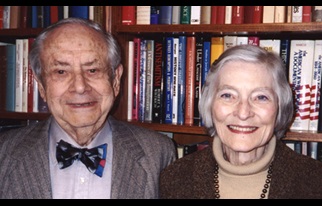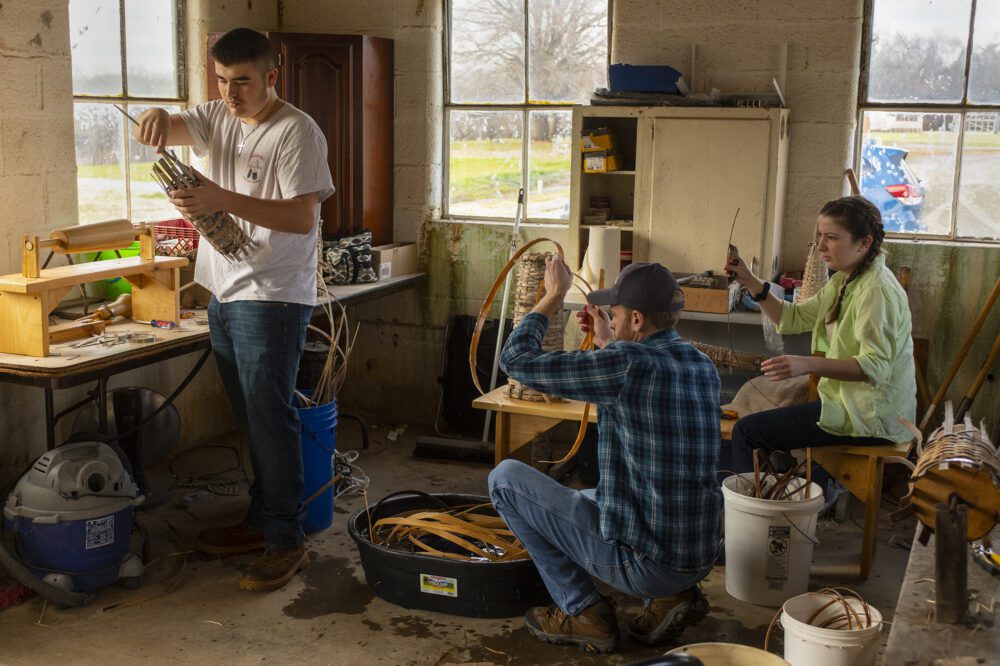By George Hanlin, Director of Grants, Indiana Humanities
Each year at the National Humanities Conference, the Federation of State Humanities Councils presents the Schwartz Prize to up to three state or jurisdictional councils in recognition of outstanding public humanities programming. It’s a coveted award, but chances are that most people don’t know anything about the prize’s namesake — Martin and Helen Schwartz — and why it’s named for them.
As the Federation looks to present the prize at the 2023 conference in Indianapolis, it’s an opportune time to call attention to the Schwartzes. They were Hoosiers, and Martin Schwartz in particular played a key role in establishing the Federation and making the conference possible.
Martin Schwartz grew up in Muncie, Ind., and graduated cum laude from Harvard in 1938. After college he returned to his hometown and spent most of his career running his family’s business, the Schwartz Paper Company, with time away for naval service during World War II. In 1940 he met and married Helen Berger of New York City, who attended Wellesley College.
In 1972, Virginia Ball, also a Muncie resident and an acquaintance of the Schwartzes, approached Martin Schwartz and asked him to join the board of a new organization she had helped to found, the Indiana Committee for the Humanities (now Indiana Humanities). Schwartz had a strong interest in the humanities and accepted the invitation. He played a vital role in growing the young council and in 1975 became Indiana Humanities’ chair.
According to Schwartz, about that same time, he was approached by John Barcroft, who oversaw the public programs division of the National Endowment for the Humanities and who was instrumental in setting up the state councils. In a 1997 memo he wrote to Richard Lewis, former director of Oregon Humanities, Schwartz remembered that Barcroft asked him to form a committee of fellow council chairs to “serve the needs of the state programs for communication [and] exchange of information and ideas, and in effect be a ‘professional trade association’ for the state programs.” With a small grant from the NEH, Schwartz hired a team that began laying the groundwork for a new organization that would support the councils.
In his memo to Lewis, Schwartz recounted:
We immediately began talking with other state chairs and had several meetings around the country with the committee participants. All agreed there was an urgent need for an organization to serve the state councils and most of our discussions for the formation of what came to be the Federation were hashed out at several meetings prior to the formal organization meeting in Minneapolis in the fall of 1977. . . . After a careful search we selected Steve Weiland as first executive director of the soon to be born Federation.
After the establishment of the Federation in 1977, Schwartz joined the board and provided the organization with a significant financial gift (a “pump-priming contribution,” he called it). Though Schwartz made no stipulations on how the money should be spent, he wrote that “Helen and I were very pleased by the board’s decision to create an annual prize for the best state program in our name.”
In 1982 the Federation awarded the first Schwartz Prize to the Rhode Island Council for the Humanities for its program “The Trinity Humanities Series: The Dramatic Work as a Historical, Cultural Document.” In the four decades since, the prize has honored dozens of other excellent public humanities projects.
In his memo recounting the founding of the Federation, Martin Schwartz ended with a reflection on the award that he and Helen established. “The success of the Schwartz prize as a competitive stimulus,” he wrote, “has far exceeded even our most optimistic expectations.”
To learn more about Martin Schwartz and the founding of the Federation of State Humanities Councils, you can read this 1997 memo that Schwartz wrote to Richard Lewis (former director of Oregon Humanities). The Federation of State Humanities Councils is accepting nominations for the 2023 Schwartz Prize through Friday, August 4. Additional information, including a nomination packet, is available on the Schwartz Prize page.



